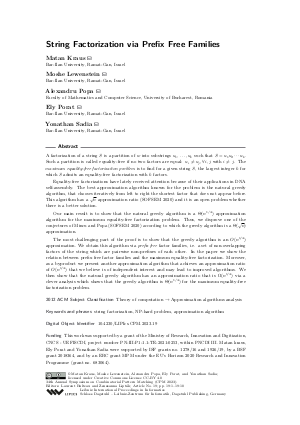String Factorization via Prefix Free Families
Authors Matan Kraus, Moshe Lewenstein, Alexandru Popa, Ely Porat, Yonathan Sadia
-
Part of:
Volume:
34th Annual Symposium on Combinatorial Pattern Matching (CPM 2023)
Part of: Series: Leibniz International Proceedings in Informatics (LIPIcs)
Part of: Conference: Annual Symposium on Combinatorial Pattern Matching (CPM) - License:
 Creative Commons Attribution 4.0 International license
Creative Commons Attribution 4.0 International license
- Publication Date: 2023-06-21
File

PDF
LIPIcs.CPM.2023.19.pdf
- Filesize: 0.66 MB
- 10 pages
Document Identifiers
Subject Classification
ACM Subject Classification
- Theory of computation → Approximation algorithms analysis
Keywords
- string factorization
- NP-hard problem
- approximation algorithm
Metrics
- Access Statistics
-
Total Accesses (updated on a weekly basis)
0PDF Downloads0Metadata Views
Abstract
A factorization of a string S is a partition of w into substrings u_1,… ,u_k such that S = u_1 u_2 ⋯ u_k. Such a partition is called equality-free if no two factors are equal: u_i ≠ u_j, ∀ i,j with i ≠ j. The maximum equality-free factorization problem is to find for a given string S, the largest integer k for which S admits an equality-free factorization with k factors.
Equality-free factorizations have lately received attention because of their applications in DNA self-assembly. The best approximation algorithm known for the problem is the natural greedy algorithm, that chooses iteratively from left to right the shortest factor that does not appear before. This algorithm has a √n approximation ratio (SOFSEM 2020) and it is an open problem whether there is a better solution.
Our main result is to show that the natural greedy algorithm is a Θ(n^{1/4}) approximation algorithm for the maximum equality-free factorization problem. Thus, we disprove one of the conjectures of Mincu and Popa (SOFSEM 2020) according to which the greedy algorithm is a Θ(√n) approximation.
The most challenging part of the proof is to show that the greedy algorithm is an O(n^{1/4}) approximation. We obtain this algorithm via prefix free factor families, i.e. a set of non-overlapping factors of the string which are pairwise non-prefixes of each other. In the paper we show the relation between prefix free factor families and the maximum equality-free factorization. Moreover, as a byproduct we present another approximation algorithm that achieves an approximation ratio of O(n^{1/4}) that we believe is of independent interest and may lead to improved algorithms. We then show that the natural greedy algorithm has an approximation ratio that is Ω(n^{1/4}) via a clever analysis which shows that the greedy algorithm is Θ(n^{1/4}) for the maximum equality-free factorization problem.
Cite As Get BibTex
Matan Kraus, Moshe Lewenstein, Alexandru Popa, Ely Porat, and Yonathan Sadia. String Factorization via Prefix Free Families. In 34th Annual Symposium on Combinatorial Pattern Matching (CPM 2023). Leibniz International Proceedings in Informatics (LIPIcs), Volume 259, pp. 19:1-19:10, Schloss Dagstuhl – Leibniz-Zentrum für Informatik (2023)
https://doi.org/10.4230/LIPIcs.CPM.2023.19
BibTex
@InProceedings{kraus_et_al:LIPIcs.CPM.2023.19,
author = {Kraus, Matan and Lewenstein, Moshe and Popa, Alexandru and Porat, Ely and Sadia, Yonathan},
title = {{String Factorization via Prefix Free Families}},
booktitle = {34th Annual Symposium on Combinatorial Pattern Matching (CPM 2023)},
pages = {19:1--19:10},
series = {Leibniz International Proceedings in Informatics (LIPIcs)},
ISBN = {978-3-95977-276-1},
ISSN = {1868-8969},
year = {2023},
volume = {259},
editor = {Bulteau, Laurent and Lipt\'{a}k, Zsuzsanna},
publisher = {Schloss Dagstuhl -- Leibniz-Zentrum f{\"u}r Informatik},
address = {Dagstuhl, Germany},
URL = {https://drops.dagstuhl.de/entities/document/10.4230/LIPIcs.CPM.2023.19},
URN = {urn:nbn:de:0030-drops-179738},
doi = {10.4230/LIPIcs.CPM.2023.19},
annote = {Keywords: string factorization, NP-hard problem, approximation algorithm}
}
Author Details
Funding
This work was supported by a grant of the Ministry of Research, Innovation and Digitization, CNCS - UEFISCDI, project number PN-III-P1-1.1-TE-2021-0253, within PNCDI III. Matan kraus, Ely Porat and Yonathan Sadia were supported by ISF grants no. 1278/16 and 1926/19, by a BSF grant 2018364, and by an ERC grant MPM under the EU’s Horizon 2020 Research and Innovation Programme (grant no. 683064).
References
-
Amihood Amir, Yonatan Aumann, Moshe Lewenstein, and Ely Porat. Function matching. SIAM Journal on Computing, 35(5):1007-1022, 2006.

-
Brenda S. Baker. Parameterized pattern matching: Algorithms and applications. Journal of Computer and System Sciences, 52(1):28-42, 1996.

-
Richard Cole, Carmit Hazay, Moshe Lewenstein, and Dekel Tsur. Two-dimensional parameterized matching. ACM Transactions on Algorithms, 11(2):12:1-12:30, 2014.

-
Anne Condon, Ján Maňuch, and Chris Thachuk. The complexity of string partitioning. Journal of Discrete Algorithms, 32:24-43, 2015.

-
Henning Fernau, Florin Manea, Robert Mercas, and Markus L. Schmid. Pattern matching with variables: Fast algorithms and new hardness results. In 32nd International Symposium on Theoretical Aspects of Computer Science, 2015, March 4-7, 2015, Garching, Germany, pages 302-315, 2015.

-
Avraham Goldstein, Petr Kolman, and Jie Zheng. Minimum common string partition problem: Hardness and approximations. The Electronic Journal of Combinatorics, 12, 2005.

-
Isaac Goldstein and Moshe Lewenstein. Quick greedy computation for minimum common string partition. Theoretical Computer Science, 542:98-107, 2014.

-
Niels Grüttemeier, Christian Komusiewicz, Nils Morawietz, and Frank Sommer. String factorizations under various collision constraints. In 31st Annual Symposium on Combinatorial Pattern Matching (CPM 2020). Schloss Dagstuhl-Leibniz-Zentrum für Informatik, 2020.

-
Markus L. Schmid. Computing equality-free and repetitive string factorisations. Theoretical Computer Science, 618:42-51, 2016.

-
Moshe Lewenstein. Parameterized pattern matching. In Encyclopedia of Algorithms, pages 1525-1530. Springer, 2016.

-
Radu Stefan Mincu and Alexandru Popa. The maximum equality-free string factorization problem: Gaps vs. no gaps. In International Conference on Current Trends in Theory and Practice of Informatics, pages 531-543. Springer, 2020.

-
Sebastian Ordyniak and Alexandru Popa. A parameterized study of maximum generalized pattern matching problems. Algorithmica, 75(1):1-26, 2016.

-
Wojciech Plandowski. Satisfiability of word equations with constants is in PSPACE. Journal of the ACM (JACM), 51(3):483-496, 2004.

-
Jacob Ziv and Abraham Lempel. Compression of individual sequences via variable-rate coding. IEEE Transactions on Information Theory, 24:530-536, 1978.

